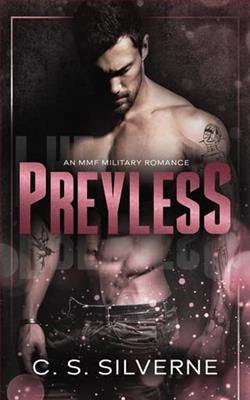Page 8 of Unholy Night
"Tomas?" My voice comes out high, strangled.
I hear him moving, steady footsteps that don't hesitate despite the complete absence of light. Even in darkness, he moves like a predator who knows his territory intimately.
"Generator's dead." His voice comes from somewhere to my left, calm and controlled. I hear the shift of fabric as he moves. "Happens in storms like this."
My chest tightens further. I can't get enough air. The darkness presses closer, and suddenly I'm back there, in that prison visiting room, Dad's voice weak through the phone: "They're moving me to solitary, Nat. It's so dark there. So dark."
Those were his last words to me. Three days later, they found him dead in his cell. Heart attack, they said. But I knew better. The stress, the isolation, the darkness—men like the Rosettis killed him as surely as if they'd put a gun to his head.
"I can't breathe." The words escape in a gasp. My knees hit the floor, though I don't remember falling. "I can't—the darkness—I can't—"
"Natalie." His voice is closer now, and I can feel the air shift as he crouches near me. Even panicking, I notice how he positions himself between me and the door, protecting me from threats only he can sense. "What's wrong?"
"My father—" Another gasp. Black spots dance at the edges of my vision, which seems impossible when everything is already black. "Prison—he died—the darkness—"
My lungs refuse to work properly. Each breath is shallow, insufficient. The panic spreads from my chest outward, making my limbs feel disconnected from my body.
"Listen to my voice." Tomas's words are steady, calm, cutting through the panic. "You're having a panic attack. You need to breathe with me. In for four counts. Hold for four. Out for four."
I try, but my body won't cooperate. My hands shake violently, and I can't stop them. Can't stop any of this.
"I can't—"
"You can." His hands find mine in the darkness—warm and solid. "Feel my hands. You're not in prison. You're in my cabin. You're safe."
Safe. With a Rosetti. The irony would be funny if I weren't drowning in memories. He smells like woodsmoke and danger, boutique cologne. A combination that shouldn't be comforting but is.
"In for four," he says, and I feel him breathe deeply, his chest expanding. "One, two, three, four. Hold."
I try to match him, focusing on his voice instead of the darkness pressing in.
"Out for four. One, two, three, four."
We repeat it. Again. Again. My trembling starts to ease, though my hands still shake in his grip. I'm hyperaware ofhow gentle his touch is, how controlled—like he's consciously restraining strength meant for violence.
"Better?" he asks, thumbs stroking over my knuckles.
"The darkness," I whisper. "I haven't been in complete darkness since—"
"Since your father died." Not a question. He knows. He's already told me how closely they watch me—the surveillance photos, tracking my investigation. "Ironic, isn't it? You're seeking comfort from someone whose family probably contributed to that darkness."
The honesty catches me off guard.
"Aurelius wrote that we suffer more in imagination than reality," he continues, voice taking on that thoughtful quality that seems so at odds with what he is. "The darkness itself can't hurt you. It's just the absence of light, not the presence of evil."
"Easy for him to say," I manage. "He wasn't dying in a dark cell because he crossed the wrong family."
"No.He was dying in exile, poisoned by his own son." His hands are still holding mine, keeping them steady, and I can feel the calluses from weapons, from violence. "But he chose how to face it. We always have that choice."
Something flickers across his face—a tightness around his eyes that suggests maintaining this gentleness is difficult. Like restraint itself is painful.
He guides me to my feet, one hand moving to my elbow to steady me. As he turns, I catch the outline of his gun at his waist, tucked where it always is, a constant reminder of what he is.
The scratch of a match breaks the silence, and suddenly there's light. Just a small flame, but after the complete darkness, it seems like the sun. He lights a candle, then another, moving around the room. The golden glow pushes back the shadows, creating a circle of warmth and safety that feels dangerously intimate.
"Better?" he asks, lighting a fourth candle.
I nod, not trusting my voice. The trembling has mostly stopped, but I still feel shaky, vulnerable. To distract myself, I start humming. The melody of "O Holy Night" fills the space between us, sacred music in this decidedly unholy situation.















